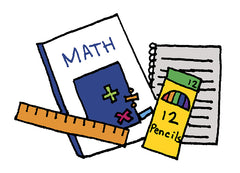Have you considered the necessity of incorporating both convergent and divergent thinking into your learning time? Experts recognize these as the 2 major types of brain challenges every human encounters.
Does that just sound like a whole bunch of big words? No worries—let’s break it down. Your child needs to be able to find the right answer when needed (math, medicine dosage) and also needs to be able to come up with a creative, unscripted answer when the situation warrants (art, architecture).
A child who can only find the “right” answer will be a rigid thinker who can’t problem-solve well or think outside the box.
A child who only thinks creatively will not be able to follow procedures or do anything that involves math.
What Is Convergent Thinking?
Convergent thinking generally involves finding a single best answer and is important in the study of math and science. Convergent thinking is the backbone of the majority of curricula and is crucial for future engineers, doctors, and even parents. Much of daily life is a series of determining right and wrong answers, and standardized tests favor the convergent thinker. But when we pursue only convergent-rich curricula, we miss the equally vital arena of divergent thinking.
Is Divergent Thinking Different?
Yes! Divergent thinking encourages your child’s mind to explore many possible solutions—maybe even ideas that aren’t necessarily apparent at first. It is in use when he discovers that there is more than 1 way to build a bridge with blocks, to animate a movie, or even simply to complete a doodle. Radically different from read-and-regurgitate textbooks, not only are divergent activities intellectually stimulating, but kids love them too.
Make a Conscious Effort to Include Both in Your Curriculum
Admittedly, because most textbooks and even puzzles are designed for convergent thinking, you will need to make a conscious effort to expose your children to multiple opportunities for divergent thinking. It is imperative because both divergent and convergent thinking are necessary for critical thinking to be effective.
Why Doctors Need Both Skills
As an example, let’s look at a medical doctor. A physician needs to be extraordinarily skilled at convergent thinking to dose medications correctly, diagnose life-threatening emergencies, and follow safety procedures to avoid infection.
However, the first person to wash his hands before surgery or to find a treatment for Ebola used divergent thinking. They were thinking outside of the usual box to solve the problem.
Some of the best doctors today are those who employ powerful convergent skills to accurately diagnose, paired with curiosity and divergent thinking to find the most effective or previously undiscovered treatment plans.
 Skip to content
Skip to content





